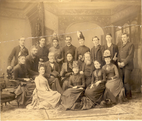For a long time, among Christian communities in China, women have outnumbered men. But in terms of preaching, in some churches, the situation is exactly the opposite — these churches do not encourage women to preach but let them serve in less visible roles.
Pastor W, who has served in rural churches for decades in the Central Plains Region shared with the Christian Times his view on this issue based on the reality in the region he served. On the one hand, he holds that we should interpret the Bible verses that say ‘do not allow women to preach’ in a dogmatic way; on the other hand, considering the reality of pastoral care of churches in China, especially rural churches, he argues that women encouraged to stand up and preach in the pulpit is helpful and beneficial to churches and believers.
First of all, Pastor W stated that some Bible verses in the New Testament say Paul forbids women to preach, we should not explain them rigidly.
He claimed that one of the important reasons why Paul did not allow women to preach in the Bible was because, in the early church, many women were disrespectful to men. But it does not mean that God won’t use women but only men; God never did in that way.
"When women work for the Lord, they have power and spiritual authority. They can cast out demons and heal the sick in the name of the Lord, which cannot be hindered by man. No matter what kind of theological view you hold or no matter how long the tradition was, they are vulnerable and cannot oppose the work of the Holy Spirit. People cannot oppose God. Peter also said, ' Can anyone keep these people from being baptized with water? They have received the Holy Spirit just as we have.' In the same way, since God has chosen them, and Holy Spirit fills them when they preach, who can stop them from preaching?" the pastor explained.
He said, "The churches that do not allow women to preach are basically influenced by some foreign denominations in the past decades. I studied theology abroad and the textbook also says women should not preach, but the teacher did not give special comments on this issue. But the church I grew up in was very different from churches that forbid women to preach. When I was a teenager, studying the Bible in the church, many women were trained and equipped to preach. They were in zeal for God’s work, I was very impressed.”
Pastor W did not reject sisters in preaching, on the contrary, he argued, "Many women are actually very good at preaching. Maybe some of them relatively lack rational and theological interpretation in preaching, which does not affect they do the work in church since they are very able to encourage others, exhort others, and let people take root in the faith."
"Women are generally more enthusiastic, while men are more stable, sometimes too calm, too rational. Women are more easily excited and zealous and can motivate believers well. In the region I serve now, the preachers are mainly women, and very few men are preachers," he added.
In many rural churches, the proportion of women congregation is very high. Pastor W said that in the past, almost 60-70% of the believers in the region he serves were female, but in recent years, the proportion has increased — around 90% of the congregation is now female. The reason could be related to the situation of our time. In the past decades, many young adults in the Central Plains Region have gone to work in the eastern coastal cities. As a result, women, children, and the elderly are left in rural churches. In his opinion, training women to be preachers is very important for pastoral caring work in the church.
In response to the question 'how can women be trained to be preachers?', Pastor W replied that even for eight to ten people, there must be a leader among them, no matter who he or she was, but a leader is necessary for a group of people. Even for three people, a leader is necessary, or people cannot gather.
"Now for rural churches, there are a lot of advantages to having local women believers come forward and preach. I am a man, and when I go to one church to preach, believers in that church think I am a minister in a higher position and they are not close with me. Also, I do not have enough time to talk with them below the surface. But the situation would be different if the churches let the local women ministers preach. They are much closer to believers, and believers can talk about anything with them. Then these women preachers can lead the believers to grow together very well."
"If I go there, they will let me preach, and they won't preach. So many times I don't want to go, and I avoid going there on purpose. I want to give them the opportunity to preach, and then they can improve” Pastor W said.
Pastor W also found that those who lead others are people who grow the fastest. Because they have the pressure to care for others, they have to invest time in down-to-earth learning. Pastor W teaches them the study method — how to read the Bible, how to read books, and how to prepare for sermons. When a person knows the correct study method, they can improve themselves.
"This is also the best method I can find so far. I don't think there is any better method in the current situation where women are more than men in rural churches, urbanization, and church ministers are basically unpaid," he concluded.
- Translated by Katherine Guo












